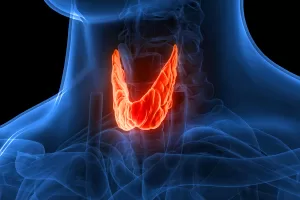Levothyroxine is a medicine employed to treat thyroid disorders. This review will be useful for individuals since it offers an all-around evaluation of Levothyroxine. Below we will discover the drug’s mechanism of action, potential side effects, what role it performs in restoring hormonal balance, and consider other aspects. Moreover, you will obtain a representation of the significance of Levothyroxine in treating thyroid-related conditions and its influence on the general well-being of patients.
What is Levothyroxine
Levothyroxine is a synthetic thyroid hormone usually prescribed to treat hypothyroidism (a condition where the thyroid gland doesn’t produce sufficient thyroid hormone). Levothyroxine operates by supplementing the body with the hormone it requires to regulate metabolism, energy levels, and general body functions.
Being a crucial drug in thyroid treatment, Levothyroxine assists in restoring hormonal balance, relieving symptoms, particularly, tiredness and weight gain, and improving quality of life for patients who experience thyroid-related disorders.
How Does Levothyroxine Work
As a synthetic thyroid hormone, Levothyroxine mimics the action of the natural thyroid hormones in the human body. It is commonly employed to manage hypothyroidism, supplementing insufficient hormone levels to regulate metabolism, energy production, and diverse body functions. By ensuring a balanced thyroid hormone level, Levothyroxine assists in relieving symptoms that are connected with thyroid disorders by improving general well-being and normal physiological processes in the body.
How Levothyroxine helps correct hormone imbalances
Levothyroxine assists in correcting hormone imbalances by supplementing the shortage of thyroid hormone in the body. Being a synthetic thyroid hormone, Levothyroxine imitates the action of the natural hormone and regulates the metabolic processes, production of energy, and overall bodily functions. By recovering thyroid hormone levels, Levothyroxine effectively eliminates hormone imbalances, facilitating symptoms of hypothyroidism and contributing to hormonal equilibrium.
Uses of Levothyroxine
As a rule, Levothyroxine is a synthetic thyroid hormone employed as a way of treatment of hypothyroidism. This is a condition where the thyroid gland doesn’t produce sufficient thyroid hormone. Levothyroxine aids in regulating metabolism and energy levels in the body.
Moreover, Levothyroxine may be taken to put down thyroid-stimulating hormones in definite cases, for instance, treating goiter or thyroid cancer. Levothyroxine performs an essential role in supporting hormonal balance and general well-being.
Hypothyroidism
Levothyroxine is commonly prescribed to manage hypothyroidism, a condition characterized by an underactive thyroid gland. By granting a synthetic form of thyroid hormone, it assists in restoring the body’s thyroid hormone levels to normal. This drug facilitates symptoms of hypothyroidism, particularly, tiredness, weight gain, and sensitivity to cold effectively, contributing to better general health and well-being.
Goiter
Levothyroxine may likewise be taken to treat goiter. This is a condition where the thyroid gland enlarges and it may cause swelling in the neck. When goiter is caused by insufficient thyroid activity, Levothyroxine aids in regulating thyroid hormone levels by decreasing the size of the goiter. By eliminating the principal hormonal imbalance, this drug treats goiter-related symptoms effectively.
Thyroid cancer
Levothyroxine is taken for the management of thyroid cancer, especially after surgical removal of the thyroid gland. After such surgical removal, natural thyroid hormone production is compromised in the human body. Luckily, Levothyroxine assists in replacing the missing hormone and averting the growth or recurrence of thyroid cancer cells by putting down thyroid-stimulating hormone levels, which may otherwise stimulate cancer cell growth.
Off-label uses
Aside from approved uses for hypothyroidism, goiter, and thyroid cancer, Levothyroxine may likewise have off-label uses. Some doctors may prescribe it for conditions not officially approved by regulatory authorities, particularly, depression, infertility, or weight loss.
Nevertheless, employing Levothyroxine for off-label purposes demands thorough consideration and monitoring because it may carry potential risks and side effects. Remember to consult a healthcare provider for relevant guidance.
How is Levothyroxine Administered
Levothyroxine is usually administered orally. The drug is absorbed through the gastrointestinal tract and then gets into the bloodstream, where it falls into the thyroid gland and other tissues to regulate hormone levels. It is recommended to take levothyroxine at the same time every day, preferably in the morning on an empty stomach. This will ensure optimal absorption and effectiveness.
Forms of Levothyroxine
Levothyroxine is accessible in diverse forms, particularly, oral tablets or capsules, liquids, and injections. This medication is also available in various strengths and comes in generic and brand-name versions. If you have complexities with swallowing tablets, a healthcare professional will prescribe you an oral solution. The diverse formulations ensure flexibility in dosing and meet the individual necessities of patients.
Typical dosages
The typical dosages of Levothyroxine may vary depending on the age and weight of the patient and the severity of their condition. For adults with hypothyroidism, the usual starting dose is 25-50 micrograms per day, which may be corrected gradually, based on response and blood test results. Dosages for children and elderly patients are commonly lower and thoroughly tailored to their concrete necessities.
Importance of regular tests
Regular thyroid function tests are of decisive importance for monitoring thyroid health and ensuring optimal well-being. These tests, particularly, measuring TSH (thyroid-stimulating hormone) and thyroid hormone levels, assist in detecting any abnormalities or imbalances in the thyroid gland. Timely identification of problems such as hypothyroidism enables patients and their doctors to correct treatment operatively, averting complications and improving general health and quality of life.
Possible Side Effects
Possible side effects of Levothyroxine may involve headache, nervousness, sweating, tremors, increased heart rate, and others. Some patients may experience mild allergic reactions, particularly, skin rashes or itching. Rarely excessive doses may result in symptoms of hyperthyroidism.
Drug interactions
Levothyroxine can’t interact with some drugs and supplements since it influences its absorption or metabolism. General undesirable medication interactions involve calcium and iron supplements, antacids, and some medications that lower cholesterol levels. Informing healthcare professionals about all drugs and supplements being taken is essential to shun potential interactions and ensure the secure and effective employment of Levothyroxine.
Food
Levothyroxine absorption may be affected by food. It is advisable to take the drug on an empty stomach, preferably in the morning, a minimum of 30 minutes before eating. Some foods like high-fiber and soy products may prevent Levothyroxine absorption. That’s why it is crucial to follow the dosing instructions granted by healthcare providers.
Medical contraindications
Levothyroxine is contraindicated in patients with untreated hyperthyroidism or adrenal insufficiency. It should likewise be taken with caution in individuals with cardiovascular problems, particularly, angina, heart disease, or arrhythmias. Pregnant or breastfeeding women and patients with definite allergies or sensitivities to the drug’s components should discuss potential risks and complications with healthcare professionals before taking Levothyroxine.
Warnings
When taking Levothyroxine, definite precautions are essential. It should not be employed as a weight-loss aid since excessive doses may result in serious health risks. The drug may not interact with certain medications or supplements since it affects its effectiveness. Pregnant or nursing women, patients with heart issues or adrenal problems, and individuals with allergies to its ingredients should take Levothyroxine under thorough medical supervision.
Allergy
If you are allergic to Levothyroxine or any of its ingredients, do not take this drug. Allergic reactions to Levothyroxine may range from mild skin rashes and itching to severe reactions such as swelling of the face, tongue, or throat, which may be dangerous to life. If you experience any signs of an allergic reaction after using this medication, ask for medical aid immediately and stop taking it.
Medical conditions
Levothyroxine employment demands caution in patients with definite medical conditions. Individuals with untreated hyperthyroidism, adrenal insufficiency, or cardiovascular problems such as angina, heart disease, or arrhythmias should consult their doctors before using Levothyroxine. This drug may worsen these conditions or interact with other treatment methods, which requires thorough monitoring and potential dosage corrections to ensure its secure and effective use.
Other
Other crucial warnings that are connected with Levothyroxine use involve shunning its employment for weight loss or obesity treatment. This drug is specially designed for treating thyroid conditions and should not be taken for other objectives. Moreover, as mentioned, definite medications, supplements, or foods may interact with Levothyroxine, affecting its absorption and effectiveness.
Customer Reviews
The drug is effective!
- When I was diagnosed with hypothyroidism, my doctor prescribed me Levothyroxine. This drug really works if taken according to the doctor’s guidance.
- I highly recommend it!
After starting to take these pills, a good reaction did not keep me waiting long. - It really works.
Despite feeling headache and nervousness while taking Levothyroxine, this medication really assisted me in treating hypothyroidism.
Summary
Levothyroxine is an irreplaceable medication to treat hypothyroidism, goiter, and thyroid cancer. By considering the above-discussed dosage, administration, possible side effects, interactions, and warnings, you will be able to decide whether to take Levothyroxine or use other drugs. Remember to take medications with caution and under the proper medical supervision to ensure effectiveness and good well-being.
FAQ
What are the most common side effects of levothyroxine?
The more common side effects of Levothyroxine may involve headache, increased appetite, nervousness, weight loss, sweating, heat sensitivity, tremors, hyperactivity, increased heart rate, anxiety, and others.
When is the best time to take levothyroxine?
The best time to take Levothyroxine is in the morning, on an empty stomach, and at least 30 minutes before having breakfast.
Do you gain weight with levothyroxine?
When taken as prescribed and at the relevant dose, Levothyroxine should not cause weight gain.
What are the side effects when you start taking levothyroxine?
Some common side effects that may arise when starting to take Levothyroxine involve weight alterations, insomnia or sleep disturbances, nervousness or anxiety, etc.




